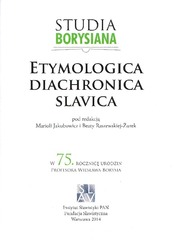Прасл. *rog‑ ‘видети, гледати’?
Common Slavic *rog- ‘to see, to look’?
| dc.creator | Лома, Александар | |
| dc.date.accessioned | 2019-11-27T14:58:34Z | |
| dc.date.available | 2019-11-27T14:58:34Z | |
| dc.date.issued | 2014 | |
| dc.identifier.isbn | 978-83-64031-07-6 | |
| dc.identifier.uri | https://dais.sanu.ac.rs/123456789/6695 | |
| dc.description.abstract | In Serbian folklore, babaroga is a female, witch-like equivalent of the boogeyman. Its name appears to be a quasi-compound, arisen through the agglutination of two juxtaposed words, first of them being obviously baba ‘old woman’, whereas the second one, roga, can be variously interpreted. A derivation from CSI *rogs, Lith rdgas ‘horn’ has been proposed by Otkup&¢ikov, not only for babaroga, but also for Lith rdgana ‘witch’, whereas in the Moscow dictionary only the variant babaruga is considered, which is explained as a combination of baba with the verbal root of rugati se ‘to mock’ < CS] *rgg-. The discussion in the second volume of Serbian etymological dictionary is inconclusive about whether the original form is *babargga, going back to a carnival figure personifying the Great Fast, or babaroga. In the latter case, the underlying semantics ‘knowing, seeing’ is judged more probable than ‘horned’ and a relationship with Lith rdgana taken into consideration, with regard to its traditional etymology, deriving it from régeti ‘to see’, as well as to the semantic parallel provided by *védoma ‘witch’ from the root *vid- / *véd- / ‘to see, to know’. Recently a new etymological proposal for baba-roga /-ruga has been put forward, claiming it to be a semi-calque of German Rogenmuhme ‘Rye Mother’, which is hardly compatible with both the phonetic shape of the word and its area. As for the latter, *7oga ‘witch’ seems to be rooted in Montenegrin coastland. To the derivatives rogulja and rogoSa recorded there by Vuk a new dialectal evidence from the region of Spi¢ may be added. That are two compounds, vjéstoroga and Ordoroga, both meaning ‘witch, hag’ and sharing the same second element -roga, whereas the first ones are clearly related to two words for ‘witch’, vjeSt-ica and ord-ulja re- spectively, the former reflecting Common Slavic *véscica from the same root as *védoma, the latter of obscure etymology. Those words not only prove that baba-roga is the older variant and baba-ruga the secondary one, but they also speak against the derivation from *rog» and in favour of the relationship with Lith rdgana as a derivative from the verb régeti. There are also further possible traces of the verbal root *rog- ‘to see’ in Serbo-Croatian: razrok ‘cross-eyed’ < *orz-rogb with -g > -k due to the synonymous razok < *orz-oke, raz-rogaciti (oci) ‘to open wide (eyes)’ probably a denominal verb based on the composite adjective *rogo-okv(jo) ‘with protruding eyes’ >*rogake, cf. na-roguSiti se ‘to bristle’ from OSerb rogo-uh ‘with protruding ears’. The initial dilemma between ‘horn’ and ‘to see’ may be solved by assuming, with Jégers, that Lith ragana, régeti, Latv ragana, redzét, régt ‘to be angry’, régudtiés ‘to goggle, to stare’ ultimately derive from the same root, PIE *regh- ‘to sit up, stand upright’, as Lith ra@gas, Latv rags, OPrus ragis, CSI *rogp. Consequently, the same verbal adjective BS] raga- may have been substantivised in the intransitive meaning ‘protruding’ as *7agas m. ‘horn’, and in the causative one ‘making vis- ible, bringing to light’ as *ragd f. ‘seeress’. German parallels suggest that pagan predecessors to the medieval witches were women believed to be clairvoyant. | en |
| dc.language.iso | sr | sr |
| dc.publisher | Warszawa : Instytut Slawistyki PAN, Fundacja Slawistyczna | sr |
| dc.relation | info:eu-repo/grantAgreement/MESTD/Basic Research (BR or ON)/178007/RS// | sr |
| dc.rights | openAccess | sr |
| dc.rights.uri | https://creativecommons.org/licenses/by-nc-nd/4.0/ | |
| dc.source | Studia Borysiana. Etymologica – diachronica – slavica. W 75. rocznicę urodzin Profesora Wiesława Borysia | sr |
| dc.title | Прасл. *rog‑ ‘видети, гледати’? | sr |
| dc.title | Common Slavic *rog- ‘to see, to look’? | sr |
| dc.type | article | sr |
| dc.rights.license | BY-NC-ND | sr |
| dcterms.abstract | Loma, Aleksandar; Цоммон Славиц *рог- ‘то сее, то лоок’?; Цоммон Славиц *рог- ‘то сее, то лоок’?; Prasl. *rog‑ ‘videti, gledati’?; | |
| dc.citation.spage | 73 | |
| dc.citation.epage | 85 | |
| dc.type.version | publishedVersion | sr |
| dc.identifier.fulltext | https://dais.sanu.ac.rs/bitstream/id/26832/loma.rog.2014.pdf | |
| dc.identifier.rcub | https://hdl.handle.net/21.15107/rcub_dais_6695 |

